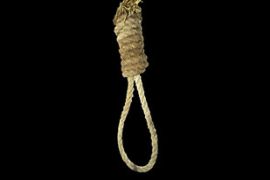Amnesty condemns Japan hangings
Executions carried out without warning to inmates or their relatives.

Published On 25 Dec 2006
At the time he said the death penalty went against his Buddhist beliefs.
Although he later withdrew the remark, he authorised no executions during his 11 months in office.
The last execution took place on September 16, 2005, when one inmate was hanged.
Executions in Japan are often carried out when parliament is not in session. Critics say this is to avoid debate on the issue.
Inmates and their families are rarely told of an impending execution until the day itself, a practice human rights groups condemn as inhumane.
A statement read by a Justice Ministry spokesman confirmed that four executions had been carried out, but did not name the inmates or give further details.
Until 1998, Japan refused to publicly acknowledge executions, which are done by hanging.
Death row
A statement from Amnesty International Japan named the executed inmates as Yoshimitsu Akiyama, Yoshio Fujinami, Michio Fukuoka and Kiroaki Hidaka.
Akiyama, aged 77, was the oldest of the four and had spent almost 20 years on death row according to Japan’s Kyodo news agency.
Condemning Monday’s exectutions Amnesty called for Japan to abolish the death penalty, saying that 88 nations, including most developed countries, have already done so.
After Monday’s executions, an unnamed Japanese official told the Associated Press that 93 inmates remain on death row.
The highest-profile inmate on death row is Shoko Asahara, the spiritual leader of the Aum Shinrikyo cult which attacked the Tokyo subway with nerve gas in 1995, killing 12 people and injuring thousands more.
Opinion polls consistently show most Japanese back the death penalty believing it to be a deterrent to a rise in violent crime seen in recent years.
Source: News Agencies